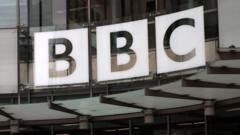Is Gregg Wallace the BBC's Biggest Problem?

Understanding the Controversy Surrounding BBC's MasterChef and Gregg Wallace
The release of the report into BBC's MasterChef has sent shockwaves through the television community and among fans alike. With 83 allegations made against renowned presenter Gregg Wallace, and 45 of those upheld, the implications are profound and far-reaching. The nature of these allegations ranges from unwelcome physical contact to bullying and inappropriate sexual language. Wallace has expressed his regret for the distress caused, but the question remains: what should the BBC do with the series that features him, particularly the upcoming season filmed before his suspension? This article delves deep into the ramifications of this situation, the potential impact on the contestants, and the broader implications for the BBC and the television industry as a whole.
The Allegations: A Breakdown
In the wake of the report's findings, the nature of the allegations against Wallace raises significant concerns about workplace conduct in the entertainment industry. Here's a closer look at the types of allegations made:
- Unwelcome Physical Contact: One allegation of inappropriate physical behavior.
- State of Undress: Three allegations involving being inappropriately dressed.
- Bullying: Seven allegations of bullying that create a toxic work environment.
- Inappropriate Language: The majority of allegations relate to the use of sexual humor and language deemed unsuitable for a professional setting.
The BBC's Response: Accountability and Responsibility
The BBC has publicly apologized to those affected by Wallace's behavior and has confirmed that it will not work with him in the future. This statement signifies a serious commitment to accountability and responsibility. However, the decision on whether to air Wallace's final series of MasterChef poses a moral and ethical dilemma for the broadcaster.
The Dilemma of Airing the Final Series
Initially, the instinct to scrap the series might seem justified. After all, should the actions of one individual overshadow the hard work and dedication of countless contestants? However, as the discussion unfolds, it becomes clear that the issue is far more complex.
Impact on Contestants
MasterChef is not merely a television show; it serves as a launchpad for culinary careers. For many contestants, winning or even participating in the show can lead to life-changing opportunities, including book deals, restaurant partnerships, and increased visibility in the culinary world.
Take Thomasina Miers, for instance. After winning MasterChef in 2005, she went on to become a successful restaurateur with her brand Wahaca, which boasts multiple locations across the UK. Stories like hers are not unique; many contestants have leveraged their MasterChef experience to achieve great success in the culinary field.
By choosing to air the series, the BBC would provide the contestants—especially the winner of this latest season—their deserved recognition and opportunities. Conversely, shelving the series could effectively punish talented individuals for the actions of Wallace, which raises ethical concerns.
Finding a Balance: Minimizing Wallace’s Presence
Given the circumstances, the question arises: how can the BBC responsibly air the series while minimizing Wallace's impact? One potential approach is to limit his on-screen presence significantly. By focusing more on the contestants, the food, and the judges, the show can serve its primary purpose: showcasing culinary talent.
Editing Strategies
While it's unrealistic to entirely edit Wallace out of the series, there are several strategies the BBC could employ to lessen his visibility:
- Focus on Contestants: Emphasize storytelling around the contestants, highlighting their journeys, challenges, and triumphs.
- Reduce Wallace’s Dialogue: Limit his commentary and interactions, allowing the food and contestants to take center stage.
- Utilize Voiceover Narration: Consider using voiceovers or other narrators to guide the audience through the series, reducing Wallace’s direct involvement.
The Broader Implications for Television and Broadcasting
The controversy surrounding Wallace and the MasterChef series raises larger questions about accountability in the entertainment industry. With the increasing awareness around inappropriate behavior and workplace misconduct, broadcasters and production companies must take proactive steps to create safe environments for all involved.
Lessons Learned
This situation serves as a reminder of the importance of establishing clear codes of conduct, providing proper training, and ensuring that all staff feel safe and supported. Moving forward, here are some key lessons that can be extracted:
- Implementing Robust Reporting Mechanisms: Organizations must ensure that employees have accessible and safe ways to report misconduct.
- Regular Training: Continuous training sessions on appropriate workplace behavior and inclusivity should become standard practice.
- Transparent Investigations: Any allegations should be taken seriously, with transparent investigations conducted by independent parties.
The Public Reaction: Navigating a Complex Landscape
Public opinion is divided regarding the airing of Wallace's final series. Many viewers express revulsion at the thought of seeing him on screen again, while others argue for the importance of giving contestants their due recognition. This complexity highlights the challenges that media organizations face in balancing ethical considerations with audience expectations.
Wallace’s Response and Its Implications
In light of the allegations, Wallace's statement has drawn criticism. He claimed that none of the serious allegations were upheld and attributed his behavior to a late autism diagnosis. This response may appear to some as an attempt to deflect responsibility and portray himself as a victim, which can further alienate those who have suffered as a result of his actions.
While mental health and neurodiversity are important topics, using them as a shield against accountability can be problematic. It is crucial for public figures to own their actions and the consequences that follow.
Conclusion: A Path Forward for MasterChef
The decision about whether to air Wallace's final series of MasterChef is not simply about ratings or financial considerations. It is a complex moral question that requires careful thought and empathy for all involved, particularly the contestants who have worked hard to achieve their dreams. In the end, airing the series with a reduced presence of Wallace could be the most equitable solution, allowing the contestants to shine while holding Wallace accountable for his actions.
As we navigate this tumultuous landscape, it’s vital to remember that the essence of MasterChef is about passion, talent, and culinary excellence. Let’s support the contestants who have poured their hearts into their craft and allow their stories to be told—while ensuring that those who have caused harm face appropriate consequences.
FAQs
What will happen to the MasterChef series that features Gregg Wallace?
The BBC has not made a final decision yet, but there are discussions about airing the series with limited visibility of Wallace.
How have previous winners of MasterChef benefited from the show?
Many previous winners have launched successful careers in the culinary world, including restaurant ownership, publishing cookbooks, and becoming television personalities.
What steps can the BBC take to ensure a safe working environment for contestants and staff?
Implementing robust reporting mechanisms, conducting regular training on workplace conduct, and ensuring transparent investigations are essential steps.
In this age of accountability, how can we ensure that the actions of a few do not overshadow the achievements of many? #MasterChef #GreggWallace #Accountability
Published: 2025-07-14 15:57:09 | Category: Entertainment



